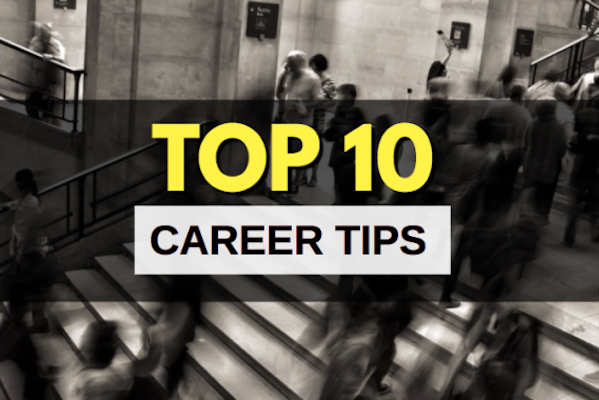The Statistics
In September of 2016, The Bureau of Labor Statistics reported that:
“The median number of years that wage and salary workers had been with their current employer was 4.2 years in January 2016, down from 4.6 years in January 2014.”
What this means is that if your working life spans roughly 42 years, you will have at least 10 jobs in your lifetime. If you ask me, that is a big number. For some people, they have been in the same job for over 30 years, and for others, they change jobs every other year.
These statistics lead me to believe that people must not be very happy in their jobs if, on average, they are only staying in their jobs for 4 years. What shocked me was the 2016 job satisfaction statistic that showed quite the contrary. The Society for Human Resource Management research shows that “88% of U.S. employees reported overall satisfaction with their current job, marking the highest level of satisfaction over the last decade.” If this is the case, wouldn’t we have seen an increase in average tenure since 2014? After reading these statistics, I was prompted to reflect on what it is that employees can do to have more control over their careers, so that they can have ultimate career satisfaction.
1. Understand Your Professional Brand
With the advent of social media, knowing and managing your brand has become more important than ever. Before the internet, what people knew about you was typically from their first-hand experience with you or by way of a trusted source. Today, if not managed, your brand can be misunderstood and ultimately, it could negatively impact your career. Your personal brand is all about who you are and what you want to be known for. Always remember, your brand is about who you are not what you do. “Your brand is what other people say about you when you’re not in the room. (Jeff Bezos, Amazon)
2. Discover What Makes You Happy
“Scientific studies show that when people are happier, they are more productive, more collaborative, and more creative…The happier people are, the more likely they will be successful in the first place,” says Dr. Killingsworth who created www.trackyourhappiness.org, a scientific project that uses smartphones to study happiness in real-time during everyday life. The benefits of happiness are measurable, and it is up to you to uncover what makes you happy. If you aren’t happy in your job, ask yourself why? Success does not breed happiness rather happiness breeds success. Don’t underestimate the impact of this on your career.
3. Take Risks: Failure is an Option
How often are you paralyzed by fear? The fear keeps us in the same job, at the same company, and we get by. What if I asked you to get up out of your comfy desk chair and take a risk? The common reply is, “but what if I fail?” I am here to tell you that failure is a good thing. Failure gets you one step closer to success. Ever since we were children our parents said, “if at first you don’t succeed, try, try again. Today, we have thought leaders telling us the same thing in modern day terms. Mark Zuckerberg said, “the biggest risk is not taking any risk… In a world that’s changing really quickly, the only strategy that is guaranteed to fail is not taking risks.” Get outside of your comfort zone. I dare you!
4. Engage a Mentor
Early on in my career, I learned the value of having a mentor. A mentor is not simply a figure head or someone to admire from afar. A mentor is a person with whom you actively engage to guide you throughout your career journey. Mentors can propel your career in countless ways. They can help hone your professional skills, enhance your industry knowledge, navigate corporate politics, and introduce you to the right people and resources to advance your career. The mentoring relationship is up to you, and it is not a one-way street. Be respectful of your mentor’s time and investment in you. Set clear guidelines for communication so that you maintain balance in the relationship. Finally, don’t be afraid to ask someone to be your mentor. Mentor relationships, if properly nurtured, may last a lifetime.
5. Nurture Connections
A common word used when discussing our careers is the word “networking.” Merriam-Webster defines networking as “the exchange of information or services among individuals, groups, or institutions.” To me, networking is typically focused on self first and other second. How will this help me? I prefer to use the word “connecting” rather than networking. Merriam-Webster says connecting is “to become joined; to have or establish a rapport.” Connecting is about the other and suggests a greater permanence. Take the time to nurture your connections over time and don’t just call on them when you need them. Be a resource to others and lead with how YOU can help them. It is that simple.
6. Ask for Help
Asking for help is not, I repeat, is not a sign of weakness. Often times, we don’t ask for help out of fear that we will appear uncertain, lost, and quite frankly, vulnerable. Author and social anthropologist Brené Brown writes, “vulnerability is not weakness. It’s the most accurate measurement of courage.” Navigating ones career is full of uncertainty. The beauty of asking for help is that you get to learn from others. Think of asking for help like the Waze App. Those that have driven before can help you avoid road hazards and provide guidance to accelerate your journey.
7. Keep Learning
“Scientia potentia est” is a Latin aphorism meaning “knowledge is power”. If you want to ensure success in your career, be a lifelong learner. Whether or not you are looking to transform your career, it is essential to continue educating yourself. If you are lucky, your company will provide some training. However, due to the expense of training, it is often cut from budgets. You must take responsibility for keeping up with industry trends, professional development, and thought leadership to enhance your career journey. As Theodore Roosevelt said, “whenever you are asked if you can do a job, tell ‘em, ‘Certainly I can!’ Then get busy and find out how to do it.”
8. Be Authentic
How you behave and how you engage is everything in the workplace, and if you have to choose one way to be, be authentic. To align successfully with your goals, you cannot pretend to be someone that you are not. Authenticity is being true to one’s own personality, spirit, or character. As you evaluate your career decisions, be mindful of your core personal values so that you can map them to the culture and values of potential employers. If they don’t mesh, keep moving. “Live authentically. Why would you continue to compromise something that’s beautiful to create something that is fake?” Steve Maraboli, Life, the Truth, and Being Free.
9. Stand for Something
Midway through my career I learned the importance of developing a personal and professional brand thanks to the encouragement of my mentor. I am grateful for this advice as, up until then, I assumed promotions and recognition would be based upon my hard work and sales performance. Little did I realize that performance alone would not pave the road to my success; I had to stand for something. Be your own cheerleader and know what you are cheering about! “If you stand for something you will have people for you and people against you. But if you stand for nothing you will have nobody for you and nobody against you.” Maurice Saatchi
10. Create Your Dream Job
If you follow tips 1 through 9, you will have the power to create your Dream Job. Having your dream job doesn’t necessarily mean you have to leave your current employer. Find what makes you happy, and work with people who inspire you, support you, and allow you to fail. This drives creativity and innovation. ”Your work is going to fill a large part of your life, and the only way to be truly satisfied is to do what you believe is great work. And the only way to do great work is to love what you do. If you haven’t found it yet, keep looking. Don’t settle. As with all matters of the heart, you’ll know when you find it.” Steve Jobs





